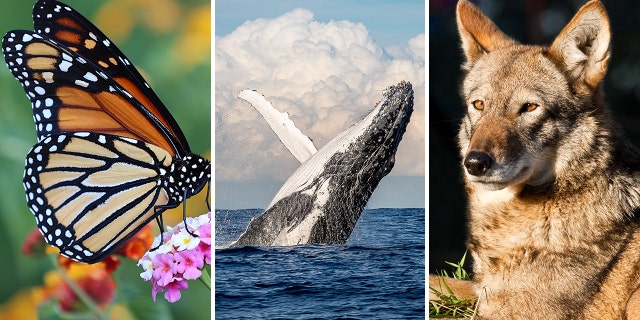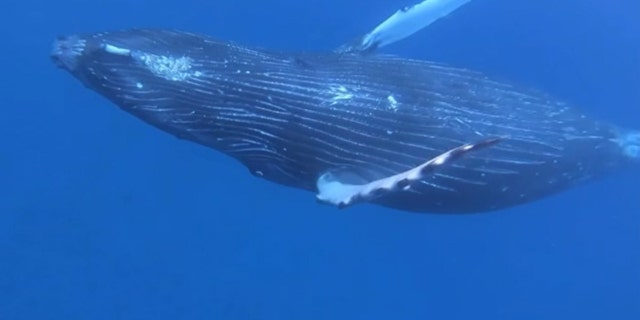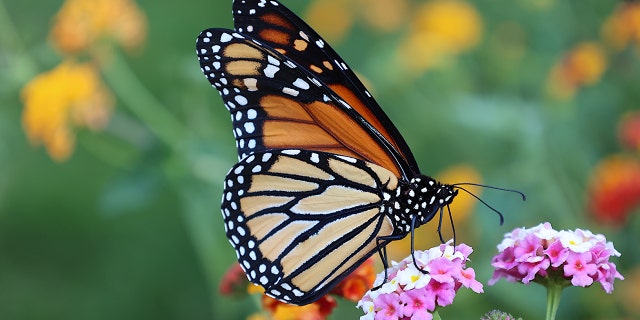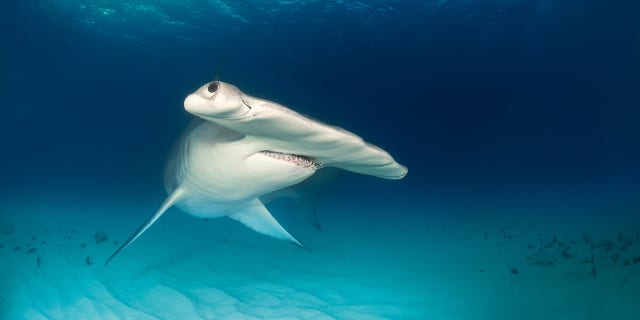In honor of National Endangered Species Day, take a look at quick tidbits about creatures in the U.S. that are at risk of extinction.
From the eye-catching monarch butterfly to the aquatic Black Warrior waterdog, here’s a list of some endangered species that are found in America – plus fascinating and numerical facts attached to them.

Read about the beautiful animals that live in our country that face extinction, and what wildlife conservationists are doing to protect these species. (iStock)
1. In what years was the humpback whale listed as endangered?
All species of the humpback whale are listed under the Endangered Species Conservation Act. The species was first listed in the Endangered Species Conservation Act in 1970 and was listed under the Endangered Species Act in 1973, according to the National Oceanic and Atmospheric Administration.

Humpback whales have been considered endangered since 1970 and were acknowledged once again in 1973. (Hawaii DLNR)
In 2023, the safety of the humpback whale was recently brought to attention once again, after a US judge ruled that the National Marine Fisheries Service violated the law when the organization “failed to develop a plan to prevent West Coast commercial sablefish fishermen from harming humpback whales,” reported the Associated Press (AP).
The estimate for the number of humpback whales that are currently in the North Atlantic Ocean, including U.S. Atlantic coastal waters, according to the National Oceanic And Atmospheric Administration (NOAA), is 10,400 to 10,752 animals.
2. What is the maximum length of the Black Warrior waterdog?
The Black Warrior waterdog has a maximum length reported of 9.8 inches, shared the forestry of Alabama. Waterdogs are large, aquatic salamanders, with this specific species dwelling in the Black Warrior River in Alabama.
The Black Warrior waterdog was first assessed by the International Union for Conservation of Nature (IUCN) Red List in 2004, and was officially named endangered in 2018, stated the forestry of Alabama.
“The Black Warrior waterdog is also listed as critically endangered by the Alabama Natural Heritage Program and the Alabama Department of Conservation and Natural Resources, which found that of 113 surveyed sites in 59 streams, the Black Warrior waterdog was found at only 14,” reported the Encyclopedia of Alabama.
3. What is the typical lifespan of monarch butterfly?
The typical lifespan of a monarch butterfly is between two and six weeks, according to the United States Department of Agriculture. Now, the most recent generation of monarchs can live for upwards of eight or nine months, according to the government site.
Monarch butterflies are one of the most identifiable insects on the endangered species list with its bright orange wings and black veins connected to the black border. The attractive, winged creature was listed at endangered in December 2022, but was not officially added to IUCN Red List until July 2022, according to the IUCN.

Monarch butterflies were listed endangered in 2018, but were officially added to the list in 2022. (iStock)
The World Wildlife Fund (WWF) suggests planting the correct species of milkweed to help monarch butterflies thrive, as their wintering habitat has dropped 22% in one year, according to a March 2023 article posted on worldwildlife.org.
4. How many pounds of eggs will a female loggerhead sea turtle lay?
The loggerhead sea turtle can lay upwards of 35 pounds of eggs in a single nesting season, noted the Alaska Department of Fish and Game. These sea turtles are also capable for traveling over 7,500 miles “between their nesting beaches and their foraging grounds,” the government site continued.
A loggerhead sea turtle was released from a Florida rehabilitation center in February after being found near North Hutchison island with a tear in its lung back in December, reported the AP.
Loggerhead turtles are protected under the Endangered Species Act, according to the NOAA.

The loggerhead sea turtle can produce 35 pounds worth of eggs in one nesting season. (Georgia Department of Natural Resources via AP, File)
In the U.S., both the NOAA and the U.S. Fish and Wildlife Service (FWS) along with other agencies, work together “to conserve and recover sea turtles and have issued regulations to eliminate or reduce threats to sea turtles,” the NOAA wrote on its website.
5. What’s the total population of red wolves?
The total population of red wolves is believed to be anywhere between 15 and 17, according to the US Fish and Wildlife Service (FWS). However, there are 12 affirmatively known through the use of radio-collars.
The red wolf was first considered to be “threatened with extinction” in 1967 under the Endangered Species Preservation Act. A new recovery plan for the endangered species was drafted on September 28, 2022, FWS continued.
6. How many species of hammerhead sharks are on the red list for extinction?
There are a total of 10 species of hammerhead sharks, but only two had made it to the International Union for Conservation of Nature (IUCN) Red List of Threatened Species.
The great hammerhead and the scalloped hammerhead are both considered to be endangered, but another two species, smooth hammerhead and the winghead are both noted as “vulnerable,” reported the Australian Marine Conservation Society.
Scalloped hammerhead sharks are threatened by commercial fishing “mainly for the shark fin trade,” according to the NOAA.

Hammerhead shark on the ocean floor (iStock)
A great hammerhead recently made headlines after a pregnant hammerhead shark, carrying 40 pups, was found dead an Alabama beach, Fox News Digital previously reported. The death is believed to be a result of “a fishing mortality,” the article stated.
Source : Fox News









